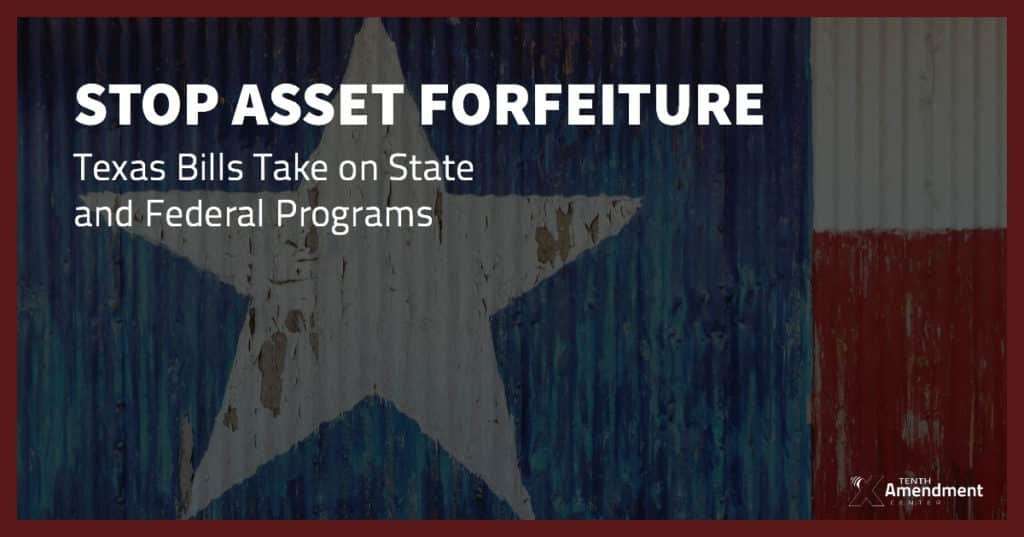AUSTIN, Texas (Nov. 29, 2018) – A bill prefiled in the Texas House would reform the state’s asset forfeiture laws to prohibit the state from taking a person’s property without a criminal conviction in most situations. Passage of the bill would also effectively close a federal loophole that allows police to circumvent more strict state forfeiture laws by passing cases off to the feds.
Rep. Senfornia Thompson (D-Houston) prefiled House Bill 404 (HB404) on Nov. 26. The legislation would effectively end civil asset forfeiture in Texas and replace it with a criminal forfeiture process. Under the proposed law, the state could not complete the forfeiture process without a criminal conviction in virtually all cases.
HB404 also addresses the “policing for profit” motive inherent in the current forfeiture process by requiring all proceeds after expenses to be deposited in the county’s general fund. Under the current law, law enforcement agencies get to keep up to 70% of forfeiture proceeds.
The Institute for Justice gives current Texas asset forfeiture laws a D+ grade, calling them “terrible.”
“The standard of proof required to forfeit property in Texas is just preponderance of the evidence, and an innocent owner bears the burden of proving that she was not involved in any crimes associated with her property before she can get it back. In addition, law enforcement agencies enjoy a strong incentive to seize property.”
Another bill (HB182) prefiled in the Texas House earlier this month would make more modest reforms to the current asset forfeiture system, but would not require a criminal conviction.
Passage of either bill would take a big step toward closing a loophole that allows state and local police to get around more strict state asset forfeiture laws in a vast majority of situations. This is particularly important in light of a policy directive issued in July 2017 by then-Attorney General Jeff Sessions for the Department of Justice (DOJ).
A federal program known as “Equitable Sharing” allows prosecutors to bypass more stringent state asset forfeiture laws by passing cases off to the federal government through a process known as adoption. The DOJ directive reiterates full support for the equitable sharing program, directs federal law enforcement agencies to aggressively utilize it, and sets the stage to expand it in the future.
Law enforcement agencies can circumvent more strict state forfeiture laws by claiming cases are federal in nature. Under these arrangements, state officials simply hand cases over to a federal agency, participate in the case, and then receive up to 80 percent of the proceeds. However, when states merely withdraw from participation, the federal directive loses its impact.
Until recently, California faced this situation. The state has some of the strongest state-level restrictions on civil asset forfeiture in the country, but state and local police were circumventing the state process by passing cases to the feds. According to a report by the Institute for Justice, Policing for Profit, California ranked as the worst offender of all states in the country between 2000 and 2013. In other words, California law enforcement was passing off a lot of cases to the feds and collecting the loot. The state closed the loophole in 2016.
HB404 would close the loophole in most situations with the following language.
A law enforcement agency or attorney representing the state may not directly or indirectly transfer seized property to any federal law enforcement authority or other federal agency unless
(1) The value of the seized property exceeds $50,000; and
(2) the attorney representing the state determines that:
(A) the activity giving rise to the investigation or seizure is interstate in nature and sufficiently complex to justify the transfer; or
(B) the seized property may only be forfeited under federal law.
The vast majority of forfeiture cases fall below that $50,000 threshold.
As the Tenth Amendment Center previously reported the federal government inserted itself into the asset forfeiture debate in California. The feds clearly want the policy to continue.
We can only guess. But perhaps the feds recognize paying state and local police agencies directly in cash for handling their enforcement would reveal their weakness. After all, the federal government would find it nearly impossible to prosecute its unconstitutional “War on Drugs” without state and local assistance. Asset forfeiture “equitable sharing” provides a pipeline the feds use to incentivize state and local police to serve as de facto arms of the federal government by funneling billions of dollars into their budgets.
HB404 will be officially introduced when the 2019 regular session begins on Jan. 8.

Kekkonshiki on November 30th, 2018 at 12:30 UTC »
Remember how Texas sheriffs visited the White House and told Trump that “the cartels will love this bill”? No, the cartels love Texas’ drug prohibition so they have a monopoly on the drug trade. Due process is always the right answer, and the best way to defeat the cartels is to cut their money supply through legalization.
Majorobviousphd on November 30th, 2018 at 06:21 UTC »
Wasn’t there a town in northeast Texas where the cops and local officials were basically pirates? Is that what prompted this bill?
Joy_blazefighter on November 30th, 2018 at 04:48 UTC »
You mean the police won't be able to take your belongs without first charging you with a crime. What is the world coming to when the police can no longer legally, straight up, rob you!